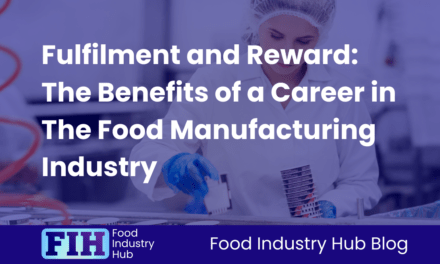Introduction
In the food manufacturing industry, resilience is a cornerstone of professional success, given the complexities of quality control, regulatory standards, and supply chain demands. Dr. Kenneth Ginsburg’s 7 Cs of Resilience framework offers valuable principles that professionals in this field can apply to strengthen both personal and team resilience. Each of the 7 C’s—Competence, Confidence, Connection, Character, Contribution, Coping, and Control—represents a core component of resilience that, when cultivated, can enhance decision-making, adaptability, and workplace well-being.
For food manufacturing professionals, applying these principles means building the mental and operational resilience needed to address everyday challenges, from production consistency to safety compliance, while also fostering a culture that prioritises continuous improvement and team empowerment. Let’s explore how each of these 7 C’s can be directly applied to build resilience and drive excellence in the food manufacturing industry.
This post is part of a collection we’ve put together to explore the topic of professional success, and you can explore the topic in more detail by browsing the related content.
Table of Contents
Key Takeaways
- Competence in food manufacturing is foundational for maintaining quality, safety, and efficiency through technical knowledge, problem-solving abilities, and hands-on experience.
- Confidence enables professionals to make informed decisions and act decisively, particularly in high-pressure situations, enhancing team trust and operational reliability.
- Connection strengthens collaboration across departments, promotes shared goals, and ensures effective communication, which is critical for problem-solving and maintaining production standards.
- Character is essential for maintaining ethical standards, acting with integrity, and making decisions that prioritise safety and quality, even when under pressure.
- Contribution focuses on taking ownership of your role, proactively improving processes, and recognising how individual efforts impact overall team success and organisational goals.
- Coping involves managing stress and adapting to challenges, ensuring that you can maintain focus and productivity in high-pressure environments, such as production delays or compliance issues.
- Control is about maintaining oversight of your actions, managing resources and processes efficiently, and fostering accountability within your team to ensure smooth operations and high standards.
- Building and applying the 7 Cs in food manufacturing creates a resilient, efficient, and quality-driven culture that supports both individual and organisational success.

Dr. Kenneth Ginsburg’s 7 Cs of Resilience
In food manufacturing, resilience is essential for navigating the complexities of production demands, quality standards, and operational challenges. Dr. Kenneth Ginsburg’s 7 Cs of Resilience—Competence, Confidence, Connection, Character, Contribution, Coping, and Control—provide a valuable framework that you can apply to enhance both personal and team resilience. Each of these seven principles represents a fundamental component of resilience that will help you tackle the industry’s demands effectively, sustain high performance, and contribute to a positive, productive workplace culture. Here’s how each of the 7 C’s can support your professional success:
- Competence
- Definition: Competence is the practical skills and knowledge that allow you to handle complex tasks effectively and confidently.
- Relevance: Competence in areas like quality control, process optimisation, and regulatory compliance builds the foundation for trust and accountability. By honing your competence, you reinforce the team’s capacity to meet production goals and address quality issues efficiently.
- Confidence
- Definition: Confidence is your belief in your ability to apply skills and make sound decisions.
- Relevance: When you’re confident in your skills, you’re more likely to take proactive steps and manage unexpected issues, whether it’s resolving production delays or responding to audit findings. Confidence enables you to approach challenges with a problem-solving mindset, which is critical in a fast-paced production environment.
- Connection
- Definition: Connection is the support network of colleagues and mentors that provides a foundation for teamwork and mutual trust.
- Relevance: In a sector where cross-functional collaboration is key, establishing strong connections helps you maintain effective communication and strengthens the team’s cohesion. Connections with quality assurance, operations, and logistics colleagues, for example, enable smoother workflows and reinforce a shared commitment to excellence.
- Character
- Definition: Character reflects your commitment to ethical values and integrity – guiding your decisions and actions.
- Relevance: Upholding high standards of character is of foundational importance in food manufacturing, where safety and quality are paramount. Demonstrating honesty and accountability reinforces a culture of trust and sets a positive example for others, ensuring that everyone upholds industry standards and takes responsibility for their role.
- Contribution
- Definition: Contribution is the understanding that your actions add value and positively impact the company and the industry.
- Relevance: When you see how your work supports food safety, customer satisfaction, or operational efficiency, it provides a sense of purpose and motivation. Recognising your contribution also reminds you of the importance of teamwork, where each role, from line operations to quality assurance, plays a vital part in overall success.
- Coping
- Definition: Coping is your ability to manage stress and adapt to challenges in healthy ways.
- Relevance: Effective coping strategies help you stay calm and focused when facing the pressures of production schedules, regulatory demands, and unexpected issues. By maintaining composure, you’re better equipped to make rational decisions and support your team, contributing to a more resilient and productive workplace.
- Control
- Definition: Control is the belief that your actions have an impact on outcomes, allowing you to take ownership of your responsibilities.
- Relevance: In food manufacturing, taking ownership of tasks—whether in production quality, safety protocols, or team leadership—reinforces accountability and drives continuous improvement. When you have a sense of control over your role, you’re more inclined to embrace challenges and take proactive steps to improve processes and resolve issues effectively.
By applying each of these 7 Cs in your daily work, you cultivate resilience that enhances your professional success and contributes to a productive, reliable workplace environment. The 7 C’s not only help you meet today’s demands but also prepare you to adapt to the evolving needs and standards of the food manufacturing industry.

The 1st C: Competence
Competence is essential for maintaining quality, efficiency, and safety in an environment where even small errors can have significant repercussions. Competence means not only having the technical skills to execute tasks but also possessing the in-depth knowledge needed to make informed decisions. In a field that involves complex machinery, regulatory requirements, and quality standards, competence gives you the ability to navigate these demands with accuracy and confidence. It’s a foundation upon which all other skills and attributes are built, allowing you to perform consistently and respond effectively to challenges as they arise.
Building competence requires continuous learning, as the food manufacturing industry is always evolving. From new technologies and automation tools to updates in food safety regulations, staying competent means remaining engaged with ongoing training and professional development. For instance, understanding the latest in hygiene practices, or mastering a software system for quality assurance, deepens your expertise and equips you to handle more complex tasks with skill. Engaging in these learning opportunities ensures that your knowledge remains relevant and that you can adapt to industry changes without compromising quality or compliance.
Competence also involves honing practical problem-solving abilities, which are critical when managing production lines, troubleshooting machinery, or addressing unexpected quality issues. When you’re able to effectively analyse a problem, identify its cause, and implement a solution quickly, you contribute to smoother operations and reduced downtime. In situations like a sudden equipment failure or a deviation from product specifications, your competence allows you to make swift, informed decisions, minimising disruptions and maintaining production standards. It’s this ability to reliably address issues that strengthens your role and boosts overall team confidence.
Demonstrating competence in the workplace builds trust among your colleagues and leadership, reinforcing a culture of reliability and excellence. When others see that you handle responsibilities with skill and precision, they’re more likely to rely on you in critical situations. This trust enhances teamwork and adds to an environment where standards are consistently met. In the food manufacturing sector, where each role contributes to the safety and quality of the final product, competence in your duties not only elevates your own performance but also ensures that the entire operation meets industry expectations and regulatory demands.

The 2nd C: Confidence
Confidence is essential for executing tasks accurately and making informed decisions under pressure. Confidence is the belief that you can rely on your skills and knowledge to handle challenges and responsibilities effectively. When you are confident, you approach tasks with a steady focus and are more likely to trust your judgment, even in high-stakes situations. In this field, where quality and safety standards are non-negotiable, confidence enables you to act decisively and uphold standards, which can be critical to the success of your team and the safety of your products.
Building confidence comes from real experience and consistent achievements. For example, when you’ve successfully managed tasks like ensuring product specifications meet customer requirements or resolving issues on the production line, you gain confidence in your ability to handle similar situations. This confidence isn’t about being over-assured; it’s grounded in knowing that you can perform and adapt based on what you’ve previously learned and accomplished. This type of confidence is essential in maintaining high morale and a positive work environment where team members feel capable and prepared.
Confidence also empowers you to address unexpected issues with composure. In food manufacturing, challenges like equipment malfunctions, supply chain disruptions, or quality deviations require calm, confident responses. When you believe in your skills and judgment, you’re more likely to take ownership of these issues and find effective solutions quickly. This helps to avoid disruptions to production and reassures your team that they can rely on you in moments of pressure. In turn, your confidence has a ripple effect, encouraging others to maintain their own confidence and composure, which supports a resilient and reliable operation.
Confidence allows for proactive behaviour, encouraging you to take on new responsibilities and continuously improve. In a complex, regulated industry, confident employees don’t shy away from taking initiative, whether that means proposing process improvements, seeking additional training, or volunteering for challenging projects. This proactive approach benefits the entire organisation, as it drives innovation, reduces inefficiencies, and reinforces a culture of growth. Confidence, therefore, is not only a personal asset but a collective strength, fuelling progress and resilience in the demanding environment of food manufacturing.

Sign-up for the Food Industry Hub Mail Service
We regularly produce new content for food industry professionals, and the Food Industry Hub Mail Service is the best way to stay up to date with the latest additions.
Signup today to be added to the Food Industry Hub mailing list.
The 3rd C: Connection
Connection is vital for effective collaboration, maintaining high standards, and ensuring seamless operations. Connection refers to the relationships you build with your colleagues, supervisors, and cross-functional teams, which establish trust and open lines of communication. When everyone in the organisation feels connected, it promotes a shared understanding of goals, such as meeting production quotas, adhering to safety protocols, and upholding quality standards. In this field, strong connections are foundational to a cohesive workforce that can tackle complex problems together, ensuring that everyone works toward common objectives.
Developing connections within your team and across departments builds a supportive environment where information flows easily, and issues are more readily addressed. For example, when quality assurance, production, and maintenance teams communicate effectively, they can pre-emptively identify potential issues or address any deviations before they escalate. In this way, interdepartmental connections help eliminate bottlenecks, reduce downtime, and prevent quality control issues. When people feel connected to their colleagues, they’re more likely to share valuable insights or best practices, which ultimately enhances everyone’s performance and contributes to a culture of continual improvement.
Connection also provides emotional support, which can be especially important in a fast-paced, high-stakes industry. Feeling connected to a team means you have people who can offer advice, guidance, or even a helping hand when things get demanding. For instance, during a product recall or an unexpected equipment breakdown, strong workplace connections allow you to rely on team members for support and expertise, reducing stress and increasing resilience. This sense of camaraderie fosters a positive workplace culture, making it easier to navigate challenges and maintain focus, even in difficult times.
Building connections fosters accountability and collective responsibility, which are essential for maintaining high standards in food manufacturing. When team members feel connected, they are more likely to hold themselves and each other accountable to do quality work and follow established procedures. This mutual accountability ensures that safety and quality standards are met consistently, as everyone feels a part of the larger mission. Strong connections, therefore, are not just about teamwork—they drive operational success by creating a network of individuals who are dedicated to achieving excellence together.

The 4th C: Character
Character is essential for creating a culture of trust, integrity, and accountability. Character refers to the ethical principles, values, and personal integrity that guide your decisions and actions, particularly when faced with challenges or difficult situations. In an industry where adherence to food safety standards, compliance with regulations, and maintaining product quality are non-negotiable, having strong character ensures that you consistently uphold these standards, even when no one is watching. It’s about making the right decisions, whether you’re handling production issues, managing safety protocols, or interacting with colleagues.
Demonstrating character in food manufacturing means consistently acting with honesty and transparency. When you encounter challenges —such as a deviation in product quality or a breach of safety protocol— your character drives you to report the issue, address it, and take steps to prevent it from recurring. This commitment to doing the right thing ensures that safety, quality, and compliance are never compromised. Your character also influences the behaviour of others around you, setting a positive example for teammates and fostering a workplace culture where ethical standards are prioritised and upheld by everyone.
Character is also crucial when it comes to managing stress or pressure. The food manufacturing industry often involves tight deadlines, high stakes, and unexpected challenges. In such an environment, your character is tested — whether you’re dealing with a production delay, a supply chain disruption, or a regulatory audit. How you respond in these moments reflects your integrity and professionalism. Maintaining composure, making informed decisions, and adhering to established protocols, even under pressure, builds trust with your team and leadership, reinforcing your role as a reliable, principled professional.
A strong character helps you to create an environment where everyone feels responsible for upholding high standards. When you demonstrate integrity, transparency, and accountability, it encourages others to follow suit, leading to a collective commitment to quality and safety. In food manufacturing, where even small lapses can have significant consequences, character ensures that everyone is aligned with the organisation’s values, reinforcing a shared mission to deliver products that are safe, high-quality, and compliant with all regulations.

The 5th C: Contribution
Contribution refers to the understanding that your actions and efforts play a critical role in the overall success of the organisation. It’s about recognising how your individual performance—whether in production, quality control, or supply chain management—directly impacts the safety, quality, and efficiency of the products being delivered. Contributing to the success of the team and organisation goes beyond meeting your daily tasks; it involves taking ownership of the outcomes and consistently striving to add value in every aspect of your work. When you understand and embrace your contribution, you are more motivated and engaged, which can drive both personal and organisational growth.
Recognising your contribution to the larger mission of the company is essential in maintaining motivation and commitment. In food manufacturing, each role is interconnected—whether you’re working on the production line, ensuring compliance with food safety standards, or optimising operational processes. Your contribution helps meet production quotas, adhere to quality control standards, and ensure regulatory compliance. When you take ownership of your role, you’re more likely to identify areas for improvement, suggest process enhancements, or even take on additional responsibilities that benefit the company as a whole. This proactive attitude not only boosts your own performance but also contributes to the organisation’s ongoing success.
A strong sense of contribution promotes collaboration and teamwork. When everyone on the team understands how their individual efforts contribute to a shared goal, it builds a culture of mutual respect and support. For instance, in a team working to address a production delay or a quality issue, understanding that your actions can have a direct impact on the outcome motivates everyone to work together more effectively. By contributing to the collective success, you help create a cohesive and resilient team, which is essential for overcoming challenges and ensuring consistent performance.
A focus on contribution helps cultivate a sense of purpose within your role. When you understand that your work directly impacts not just the company’s bottom line but also the safety and satisfaction of consumers, it can inspire a greater sense of responsibility and pride in your work. In an industry where the stakes are high, knowing that your contribution ensures the delivery of safe, high-quality products creates a strong connection between your individual efforts and the broader goals of food safety, quality, and compliance. This deeper sense of purpose is a key motivator that can drive both personal fulfilment and professional success in the food manufacturing sector.

The 6th C: Coping
Coping is an essential skill that helps you manage the stresses and pressures that come with high-stakes environments. The fast-paced nature of food production, along with the constant demand for quality control, safety compliance, and meeting production deadlines, can create significant stress. Coping refers to your ability to manage these pressures effectively, adapt to changes, and maintain your focus when things don’t go according to plan. Being able to cope with stress in a healthy way ensures that you can continue to make sound decisions, communicate effectively, and lead your team through difficult situations without letting pressure hinder your performance.
Building effective coping strategies is vital for maintaining both your mental and physical well-being. In the food manufacturing industry, challenges like supply chain disruptions, equipment failures, or tight production schedules can trigger stress. Having reliable coping mechanisms, such as taking short breaks, practicing mindfulness, or relying on problem-solving techniques, allows you to keep your composure in these high-pressure moments. Coping isn’t about eliminating stress entirely — it’s about developing resilience to handle it without compromising your effectiveness or decision-making abilities. This ability to maintain calmness and clarity under pressure is especially important when you’re making decisions that directly affect product safety or regulatory compliance.
Coping also involves adapting to unexpected changes or setbacks. Whether it’s a shift in production demands, unannounced audits, or a sudden personnel shortage, the ability to cope with change is crucial in food manufacturing. Adapting to these changes without becoming overwhelmed helps you stay productive and focused on finding solutions. For example, if an equipment failure halts production, your ability to stay calm, communicate with your team, and quickly find alternatives ensures minimal disruption. This adaptability and mental flexibility are key to maintaining smooth operations even in the face of unforeseen challenges.
Coping skills help maintain strong relationships within your team. When you can manage stress and challenges effectively, it sets an example for others and fosters a supportive work environment. Team members are more likely to remain calm and focused when they see their leaders managing pressure without panic. This sense of stability helps the entire team stay resilient, work together to overcome obstacles, and maintain a high level of performance. In food manufacturing, where product quality and safety are always at risk, developing strong coping skills ensures that both you and your team can navigate challenges while maintaining a focus on continuous improvement and excellence.

The 7th C: Control
Control is the ability to manage and direct both your actions and the circumstances around you to maintain high standards of safety, quality, and efficiency. Control doesn’t mean micromanaging every aspect of the operation but rather having a clear understanding of what needs to be done, staying focused on key priorities, and taking deliberate actions to ensure that processes run smoothly. When you maintain control, you are better equipped to respond to unexpected challenges, prevent potential risks, and uphold standards that are critical in a field that demands precision and consistency.
Exercising control in food manufacturing involves effectively managing resources, time, and personnel. For instance, when overseeing a production line, it’s essential to ensure that all processes are aligned with safety protocols, that machines are functioning properly, and that production targets are met. Maintaining control over the production process means being able to adjust workflows when necessary, monitor quality in real-time, and make quick, informed decisions if any issues arise. This kind of oversight ensures that the operation remains efficient, and that product quality is never compromised.
Control also extends to personal discipline and the ability to manage your own workload and emotions. In a high-pressure environment like food manufacturing, where deadlines are tight and challenges are frequent, maintaining control over your own reactions is essential. By staying focused and composed, you ensure that you don’t let stress or external factors interfere with your decision-making or behaviour. For example, if you encounter a compliance issue or an equipment malfunction, staying calm and following the established protocols allows you to resolve the issue quickly and efficiently, minimising any potential disruptions to the production process.
Control builds into a culture of accountability and continuous improvement. By taking control of your own responsibilities and setting a strong example for others, you help instil a sense of responsibility in your team. In food manufacturing, where teamwork and consistency are key to maintaining product safety and quality, ensuring that everyone understands their role and adheres to protocols is essential. When control is exercised properly, it creates an environment where processes are optimised, standards are upheld, and the entire operation runs smoothly, even in the face of challenges.

In Summary
In the food manufacturing industry, applying the 7 Cs —competence, confidence, connection, character, contribution, coping, and control— provides a robust framework for professional success. Each of these qualities contributes to not only individual growth but also the overall efficiency, safety, and quality of the organisation. By developing competence, you ensure that your skills align with industry demands, while confidence allows you to act decisively in critical moments. Connection and character foster trust and ethical decision-making, ensuring smooth collaboration and a culture rooted in integrity. Through a sense of contribution, you take ownership of your role and actively contribute to team and organisational success.
The ability to cope with challenges and maintain control of your actions is equally crucial in this high-pressure, fast-paced field. Coping strategies help you navigate stress effectively, ensuring that you remain productive and resilient in the face of unexpected obstacles. Control allows you to stay focused, manage processes efficiently, and hold yourself and your team accountable for maintaining the highest standards. By cultivating these 7 Cs, professionals in food manufacturing can navigate complexities, drive continuous improvement, and contribute to a safe, high-quality product that meets both customer and regulatory expectations.

Further Resources
Food Industry Hub serves the food industry with a range of digital resources for the benefit of both commercial food manufacturers and food industry professionals.
For food manufacturers, we offer integrated management systems that give every user a direct interface with your QMS.
For food industry professionals, we provide an extensive signposting service in addition to informational content we hope you’ll find useful as you face new professional challenges. We have very ambitious plans to expand the range of services offered, and currently present informational content on management, safety and quality, food safety and quality culture, and professional success.














